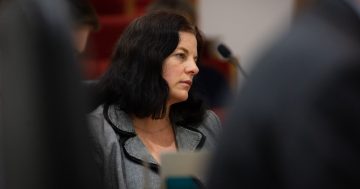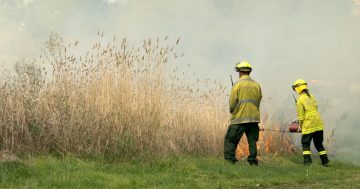
Accusations have flown that conflicts of interest are being facilitated in Legislative Assembly committee inquiry processes. Photo: Michelle Kroll.
Changes could be made to how the ACT Legislative Assembly scrutinises bills and petitions following accusations a committee inquiry member couldn’t keep their personal interests out of debates.
ACT Greens MLA Jo Clay claimed the “usual processes and natural justice” were not followed when the Standing Committee on Environment, Climate Change and Biodiversity (of which she is a member) was considering her proposed law changes to ban fossil fuel advertising at sporting grounds in the Territory.
But ACT Labor and fellow committee member Dr Marisa Paterson fired back during Tuesday’s (14 May) sitting day, stating the committee had decided to remove Ms Clay from the process as the inquiry meetings ended up not being about fossil fuel advertising but “an inquiry all about Ms Clay”.
“Blatant self-interest persisted from the moment that this bill came to our committee to this point today,” she said.
“We did not sit in the committee and debate the ins and outs of this issue. We spent every single meeting, at significant length, debating Ms Clay’s process arguments in her attempts to control every single aspect of this inquiry.
“To me, this is a situation of a member’s serious inability to manage their conflict of interest and their self-interest, and what is demonstrated in the minutes is the committee’s attempts to manage this as best we could.”
Dr Paterson proposed that the Legislative Assembly’s standing orders be reviewed after the October election and amendments moved so that MLAs have to remove themselves from a committee if a decision is made to inquire into a bill they have created.
“This is a fundamental example of how conflicts of interest have the ability to corrode confidence in our Parliament and in our committees,” she said.
ACT Greens whip Andrew Braddock took this a step further and suggested this should also be the case if an inquiry is looking into a petition sponsored by a committee member.
“[There’s] an inconsistent body of practice that we have developed here over the past term,” he said.
He pointed to an instance where Ms Clay had previously stepped aside as chair of a committee that had been looking at one of her amendment bills (but still stayed part of the inquiry and took part in the debate).
But he singled out Dr Paterson as remaining as chair of the committee looking into her bill on gaming machine law changes (and cast a vote) and for an inquiry into a petition she sponsored on the control of Indian Myna birds.
“It should not be in a committee’s powers to deprive a member, who has been elected to this place and then appointed to a committee, to be involved in the process,” Mr Braddock said.
“But that needs to be balanced with the conflict of interest that this may create.”
Ms Clay did not address the accusations about her behaviour or conduct during the inquiry process when she spoke; instead, she highlighted what she felt were key arguments for her bill that she believed were ignored.
She drew comparisons between the tobacco lobby and the fossil fuel lobby and how regulation of tobacco advertising had helped reduce the prevalence of smoking.
Ms Clay also pointed to 15 Australian councils that have already voted for fossil fuel ad bans and how submissions warned of “the dangers of greenwashing and sportswashing” by fossil fuel companies.
“The submissions led to research showing that fossil fuel company sponsorship sways consumer behaviour. Fossil fuel companies are ‘using the players’’ bodies to gain social credit’,” she said.
“Some submitters called for a much stronger fossil fuel ad ban than was presented in this bill.”
Ms Clay again questioned why the inquiry took Trade Minister Andrew Barr’s submission as the overall government’s submission when it didn’t represent a stance agreed to in Cabinet.
“This appears to be the main piece of evidence for the Committee’s recommendation not to pass the bill,” she said.
“Minister Barr spoke about visiting teams that are sponsored by fossil fuel companies and whether they would play in ACT Government venues if not permitted to advertise here.
“The tobacco lobby made similar arguments when faced with regulation on their industry.”
The committee recommended Ms Clay’s bill not pass. It will be further debated later in the year.




















